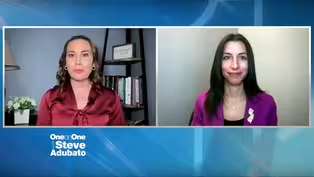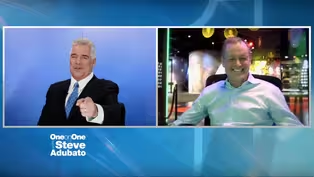One-on-One
COVID-19's impact on the New Jersey Symphony
Clip: Season 2025 Episode 2810 | 9m 21sVideo has Closed Captions
President and CEO of the New Jersey Symphony talks about COVID's impact on the arts
Steve Adubato talks with Terry D. Loftis, President and CEO of the New Jersey Symphony, to discuss what drew him to the organization, the impact of COVID-19 on the arts, and attracting a younger audience to the orchestra.
Problems playing video? | Closed Captioning Feedback
Problems playing video? | Closed Captioning Feedback
One-on-One is a local public television program presented by NJ PBS
One-on-One
COVID-19's impact on the New Jersey Symphony
Clip: Season 2025 Episode 2810 | 9m 21sVideo has Closed Captions
Steve Adubato talks with Terry D. Loftis, President and CEO of the New Jersey Symphony, to discuss what drew him to the organization, the impact of COVID-19 on the arts, and attracting a younger audience to the orchestra.
Problems playing video? | Closed Captioning Feedback
How to Watch One-on-One
One-on-One is available to stream on pbs.org and the free PBS App, available on iPhone, Apple TV, Android TV, Android smartphones, Amazon Fire TV, Amazon Fire Tablet, Roku, Samsung Smart TV, and Vizio.
Providing Support for PBS.org
Learn Moreabout PBS online sponsorship(upbeat music) - We're honored to be joined by Terry Loftis, President and CEO of a terrific organization, the New Jersey Symphony.
Terry, good to see you again.
- Good to see you, Steve.
Thanks for having me.
- You got it.
Full disclosure, you are in Dallas.
- Yeah.
- You're leading the effort there, but as we do this program toward the back end of January, in March 2025, you are coming to New Jersey from Dallas to lead the symphony.
Why?
- Well, first and foremost, I was recruited by a colleague at a search firm and was presented with this opportunity, and after reading the overview of the position and then based on what knowledge I had of the New Jersey Symphony, it was just a very appealing opportunity, and one that I definitely wanted to throw my hat into the ring for.
It's such a great diverse organization and a great music director artistically, and a great opportunity to kind of take what the artistic excellence from the staff and from the orchestra itself that's there, and take that in a new direction, so.
- Now you have said, it's a great quote from you, that running an orchestra is, quote, "A contact sport."
What?
What does that mean?
- Well, I spent the first half of my career, Steven, in marketing, communications, business development, and I've run and owned a few agencies over the course of my career that were all hectic environments.
One would not anticipate going to work for a performing arts organization a contact sport, but it is.
There are so many moving parts day to day, to managing fundraising, marketing, ticket sales, orchestra, - I'm sorry, fundraising, did you say, while we're in public broadcasting?
Did you- - Yeah.
(laughing) - I may know something about that.
Go ahead, pick it up.
- Yeah.
I used to joke with my colleagues here in Dallas that, you know, we would end our fundraising goals with success if I could hire a camera guy, lighting guy, and a sound guy to follow us around on a daily basis to see what it takes to run a symphony orchestra, because it's a, someone should make the documentary because there's so much involved behind the scenes before you see a music director and an orchestra take the stage.
- That music is the art.
That's, I'm not even gonna say the fun part, but that is the part that everyone enjoys.
But getting, and I'm not comparing what we do to the symphony, but this is the easy, fun part.
The other part, as Terry's talking about, it is definitely a contact sport I'll tell you, in public broadcasting, as well.
Hey, try this for us.
- Sure.
- In the post-COVID environment, as we're doing this five years from the original COVID crisis kicking, happening in the United States, how has COVID impacted, by the way, this is part of our Arts Connection series, you'll see the graphic up, how has COVID impacted the work of the symphony, and frankly, the work in the arts?
- Tremendously.
When COVID, the outbreak happened, I was running a arts grant organization called TACA, which funds, through grant applications, cultural arts organizations in North Texas.
And the impact was immediate.
You saw, across the country, you know, you know this, everything shut down.
If you were a performing arts organization, that impact was felt greatly.
It was, you know, dance companies couldn't perform, theater companies couldn't perform, symphony orchestras couldn't perform.
And we are still reeling with the impact from a attendance perspective, as the DSO and the New Jersey Symphony.
From a fundraising perspective, we had older donors in our core audience groups who either sadly are no longer with us or in that older generation, or have just selected purposely not to return to an environment to where they will be sitting, you know, next to a few thousand people in a concert hall.
So, moving out of that and defining what the approach will be moving forward, because there is no going back to how we were doing things pre-COVID, is maintaining that core, but equally importantly is engaging with a younger demographic to not only immerse them in what we do, but give them a reason for doing so.
So that's critical to the success of any classical performing arts organization moving forward.
- I grew up in a household where Wagner, you know, Vivaldi, and the greats, that was what was played in our home, along with Sinatra, every Saturday.
- Absolutely.
- Every Saturday and Sunday.
So I grew up around that kind of music 'cause my mother and father were obsessed.
My mom still is.
That being said, how the heck do we engage younger people, in the arts overall, but in organizations like the New Jersey Symphony, and the great music that comes out of it, please?
- Yeah, first and foremost, because the New Jersey Symphony is a state orchestra., so it's our primary home, of course, at New Jersey Performing Arts Center in Newark.
The objective is what happened with COVID to that younger generation is culture by definition is different to a younger demographic than it might be for you and I.
So you just said growing up at home, you know, there was classical music in the home.
That's not the case in many instances today.
So what happened during COVID and what we call the Netflix era is that younger demographic was already accustomed to getting all of their information from here, or staring at their televisions at home.
That was- - Yeah, "Madame Butterfly" is not playing on the phone.
- Absolutely.
And it was greatly enhanced during the pandemic.
So that definition of culture for them was other forms of live music, recreation, film, food.
And so the challenge became, rather than moving forward out of COVID saying, "We are a great art form and you should give us all of your attention," the narrative needed to switch to, "We understand in your age group that culture is defined differently.
We wanna be a part of that ecosystem as opposed to telling you that we need to be the ecosystem."
And that is beginning to take root to where we're seeing in Dallas, for example, a younger demographic that are making purchasing decisions to see our shows very last minute, because that's how they do things.
So you and I might look at, oh, you know, the New Jersey Symphony's doing, you know, "Beethoven Five," and get tickets as soon as you can.
That younger demographic, what we're seeing now, will wait 'til day of or night before to buy tickets, and we're seeing a spike in ticket sales because of that.
So it's understanding where they are and giving them our product and services based on how they buy.
- Yeah, by the way, I know my mom watches "One On One" every night.
She'd be upset that I did not mention Giacomo Puccini.
(Terry laughing) I just, I needed.
Listen, that's a family issue.
I had to get that outta the way.
- Yeah, don't get in trouble with mom.
Yeah.
- No, not, and especially when it comes to Puccini.
Terry Loftis, President and CEO of New Jersey Symphony.
Their website has been out.
Check out what they are doing, where they're doing it, and they're doing important work.
And Terry's coming from Dallas to New Jersey for our beautiful weather.
Thank you, Terry, (chuckling) for joining us.
We appreciate it.
- Steve, thanks to you so much for having me.
- Yeah, we'll talk soon.
- I'm looking forward to it.
- I'm Steve Adubato, that's Terry Loftis.
He's coming to Jersey from Dallas.
Becoming a Giant fan.
(Terry laughing) Right after this.
We'll be back.
(laughing) - [Narrator] One-On-One with Steve Adubato is a production of the Caucus Educational Corporation.
Funding has been provided by The New Jersey Education Association.
Hackensack Meridian Health.
The Turrell Fund, a foundation serving children.
Johnson & Johnson.
PSE&G.
Citizens Philanthropic Foundation.
NJM Insurance Group.
The North Ward Center.
And by The Russell Berrie Foundation.
Promotional support provided by NJ.Com.
And by New Jersey Globe.
- (Narrator) A cancer diagnosis changes everything.
- So does where you go for treatment.
- (Narrator) Where other cancer centers offer radiation, at Hackensack Meridian, John Theurer Cancer Center, We’re utilizing the world's most advanced precision radiotherapy... - That can pinpoint and destroy your cancer.
- (Narrator) Some performed clinical trials, but we have one of the nation's most rapidly growing drug discovery programs... - Providing hope with the medicine of tomorrow.
New Jersey's best cancer center.
Know the difference.
NJ State Teacher of the Year talks social-emotional support
Video has Closed Captions
Clip: S2025 Ep2810 | 8m 49s | NJ State Teacher of the Year talks social-emotional support (8m 49s)
President of the NJ Hall of Fame highlights 2024 inductees
Video has Closed Captions
Clip: S2025 Ep2810 | 9m 13s | President of the NJ Hall of Fame highlights 2024 inductees (9m 13s)
Providing Support for PBS.org
Learn Moreabout PBS online sponsorship
- News and Public Affairs

Top journalists deliver compelling original analysis of the hour's headlines.

- News and Public Affairs

FRONTLINE is investigative journalism that questions, explains and changes our world.












Support for PBS provided by:
One-on-One is a local public television program presented by NJ PBS

